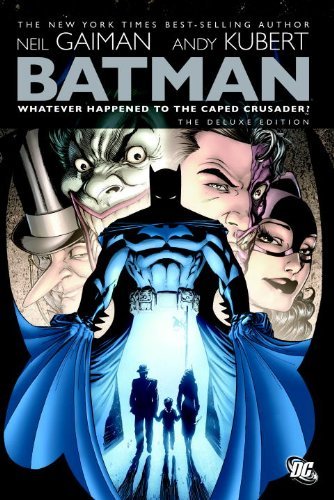The first nominee I want to cover for the Best Graphic Story Award is what seems to be the favorite—Neil Gaiman’s single-volume Batman: Whatever Happened to the Caped Crusader? The story is available in a gorgeous hardcover deluxe edition with a load of extras. (But I will not allow the extras to sway me, because they are not the nominee. I do appreciate bonus material on trade collections, though.) I’ll go ahead and say you don’t have to be buried in the Batman continuity to understand or enjoy this story; it’s a story about stories in some ways—I mean, this is Neil Gaiman we’re talking about. In fact, it’s a very coherent short story of a comic and the only standalone nominee, despite its place in the greater DC universe. That probably makes it the most easily approachable of the lot, though there’s no saying if that’ll make it the winner or not.
Gaiman is a multiple Hugo-winner already, including last year’s Best Novel category for The Graveyard Book (which also won several other cool awards). If this category had been around when Sandman was running, I have no doubts that he would have been awarded a Hugo for it, in addition to that one-time-only World Fantasy Award for the Short Story. He also hasn’t written comics in some time, as the introduction to the volume says, and it took a lot—specifically, Batman—to get him to do more.
I know that no-one here at Tor.com skips the introductory author’s note in a book, right? Right? Well, don’t skip this one, if you normally do. It sets up the tone of the piece as the “last Batman story” and Batman as a story figure for Gaiman, which helps with reading the comic itself. The plot is simple: we follow the spirit of Bruce Wayne at his funeral, but it’s an odd sort of funeral because it’s a set of people from his life—enemies, friends, lovers—telling how he died, and each version is a different Batman with a different self. In the end, Wayne is born one more time, to his parents, and the implication is that things will replay up to a point: the death of his parents, always his motivating factor. In a way, this story gives me flashes of Stephen King’s The Dark Tower series—the end is the beginning is the end, etcetera.
Some of the stories in the narrative are deeply engaging. The version Alfred tells of Bruce Wayne and his life is one of the saddest and most touching—that of a man damaged and depressed, whose friends try to keep him sane and give him a purpose. This is more the “real” superhero story we’ve been seeing so much of lately in the media. I also like the Joker’s short explanation. However, there’s something about this comic that bothers me, narratively—what’s it doing that hasn’t been done before, to some extent by Gaiman himself? Not to brush off the lovely writing and detailed characterization, they’re excellent, but the story itself rang a bit hollow for me. I liked it quite a bit, but at the same time I felt that it could have been better and done more with itself, done something new with the multiple deaths and multiple possible lives thing. Old trick, really.
The art is actually my favorite part of this comic. It’s frankly gorgeous. I love it. Andy Kubert breezes by and plucks at older styles to tell the story as much through art as Gaiman does through words. The facial expressions are so nuanced and the lines are bold and vibrant. It is one damned beautiful comic, probably the loveliest of the bunch—but that’s not enough for me, this time around.
As a Batman fan and a huge Gaiman fan I got my geek-love mileage out of this book. I really enjoyed it the first couple of reads, but I think that it might not have the same effect on a non-fan. For example, the mission statement of sorts Bruce gives as he dies, the “never give in, never give up” sort of thing, is like a ringing gong for my heart. It’s a very “hell yes, Batman never gives up” moment, because I, too, love Batman. As a standalone comic, though, cut away from that resonance the character himself has for me—it’s not doing anything new and different, no matter if it is awesome to see it done for the Batman. Good comic, yes, with a lot of power for the fans, but not best comic of the year. Not quite. Possibly the prettiest, though.
So—with great trepidation I say this—Batman: Whatever Happened to the Caped Crusader? is not my pick for this year’s Hugo. I feel the need to apologize, because I really love Gaiman and Batman, and it seems like this would have been my obvious choice, but… Nope. Can’t do it. One of my favorites for the year, yes, but not the absolute best. (Though, I’m not going to be down on it winning or other people voting for it; it’s a great comic.)
Tomorrow: Schlock Mercenary.
Lee Mandelo is a multi-fandom geek with a special love for comics and queer literature. She can be found on Twitter and Livejournal.










